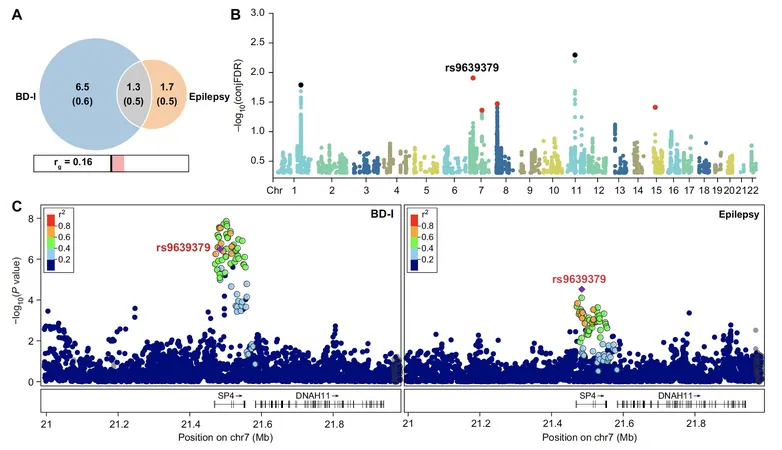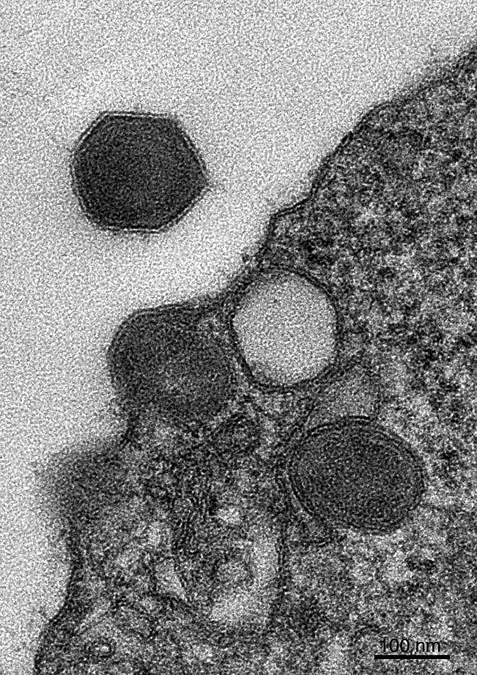
Unveiling the Hidden Genetic Bond: The Shocking Connection Between Bipolar Disorder and Epilepsy
2024-09-30
In a groundbreaking revelation, researchers from the Chinese Academy of Sciences have discovered a compelling genetic connection between bipolar disorder type I (BD-I) and epilepsy, an insight that may forever change our approach to these complex neuropsychiatric disorders.
Published in the prestigious journal *Genomic Psychiatry* on September 30, 2024, the study titled "Rethinking the connection between bipolar disorder and epilepsy from genetic perspectives" dives deep into the shared genetic variants that underpin both conditions. Led by the esteemed Dr. Ming Li from the Kunming Institute of Zoology, this research analyzed a robust dataset involving over 26,000 epilepsy cases and close to 25,000 cases of BD-I drawn from European populations, using advanced genome-wide association study (GWAS) methods.
Key Findings that Could Change Everything
1. **Genetic Correlation**: The study identified a significant positive genetic correlation between BD-I and epilepsy (rg = 0.154), suggesting a more intertwined relationship than previously understood.
2. **Shared Genetic Variants**: Approximately 1,300 genetic variants were discovered that have the potential to influence both conditions.
3. **Independent Genomic Loci**: Six genomic loci were found to be significantly connected to both BD-I and epilepsy, highlighting their shared genetic architecture.
4. **Causal Relationship**: Notably, the research demonstrated a causal effect where epilepsy may influence the onset of BD-I (P = 0.0079), challenging existing beliefs about their separateness.
Dr. Li emphasizes the importance of these findings, noting, "Our discoveries challenge the conventional understanding of bipolar disorder and epilepsy, supporting clinical evidence that mood stabilizers can benefit both conditions."
The Role of the SP4 Gene: A Game-Changer in Treatment?
Among the most riveting discoveries is the SP4 gene, with strong associations to both BD-I and epilepsy. This gene's protein, influenced by neuronal activity, plays a critical role in managing mood disorders and its stabilization through lithium, a common mood stabilizer. This revelation opens up a tantalizing possibility: Could targeting the SP4 gene lead to breakthrough treatments for both bipolar disorder and epilepsy?
Broader Implications: What About Other Disorders?
The implications of this research extend well beyond BD-I and epilepsy. The shared genetic underpinnings raise questions about other neuropsychiatric conditions, such as schizophrenia and autism spectrum disorders. Are these disorders also genetically intertwined, and what could that mean for treating them?
With advancements in personalized medicine on the horizon, Dr. Li suggests that understanding the genetic basis of these conditions could usher in more tailored and effective treatment options for individuals suffering from BD-I or epilepsy. This tantalizing prospect raises urgent questions: How can we leverage these genetic insights into practical, targeted therapies for patients?
The Neurobiological Connection: Mood and Seizures Intertwined
The study also critiques the intricate relationship between mood regulation and seizure activity in the brain. Given the shared genetic factors, researchers are now investigating the neurobiological mechanisms that link mood instability in bipolar disorder to the electrical anomalies present in epilepsy.
Despite these groundbreaking findings, the researchers acknowledge limitations within their study, such as its focus on European populations and the lack of sex-specific analysis. This raises further questions about how genetic associations might differ across ethnic groups and whether sex-specific genetic factors play a crucial role in the development of BD-I and epilepsy.
As we stand on the brink of a new understanding of the interplay between these complex disorders, the scientific community is eager for further exploration into the genetic landscape that shapes our mental and neurological health. The future of treatment for those affected by these debilitating conditions could be brighter than ever before.




 Brasil (PT)
Brasil (PT)
 Canada (EN)
Canada (EN)
 Chile (ES)
Chile (ES)
 España (ES)
España (ES)
 France (FR)
France (FR)
 Hong Kong (EN)
Hong Kong (EN)
 Italia (IT)
Italia (IT)
 日本 (JA)
日本 (JA)
 Magyarország (HU)
Magyarország (HU)
 Norge (NO)
Norge (NO)
 Polska (PL)
Polska (PL)
 Schweiz (DE)
Schweiz (DE)
 Singapore (EN)
Singapore (EN)
 Sverige (SV)
Sverige (SV)
 Suomi (FI)
Suomi (FI)
 Türkiye (TR)
Türkiye (TR)